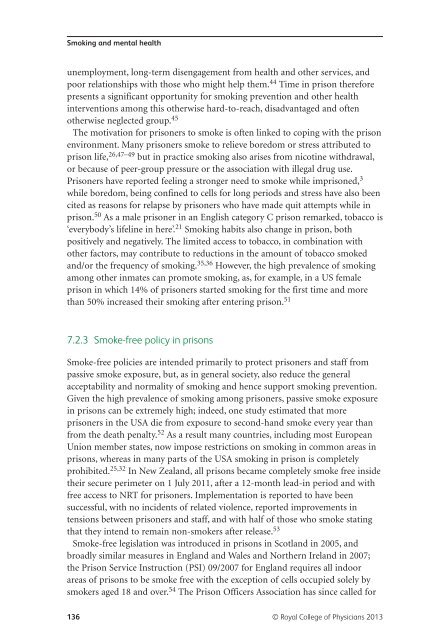Smoking and mental health - NCSCT
Smoking and mental health - NCSCT
Smoking and mental health - NCSCT
Create successful ePaper yourself
Turn your PDF publications into a flip-book with our unique Google optimized e-Paper software.
<strong>Smoking</strong> <strong>and</strong> <strong>mental</strong> <strong>health</strong><br />
unemployment, long-term disengagement from <strong>health</strong> <strong>and</strong> other services, <strong>and</strong><br />
poor relationships with those who might help them. 44 Time in prison therefore<br />
presents a significant opportunity for smoking prevention <strong>and</strong> other <strong>health</strong><br />
interventions among this otherwise hard-to-reach, disadvantaged <strong>and</strong> often<br />
otherwise neglected group. 45<br />
The motivation for prisoners to smoke is often linked to coping with the prison<br />
environment. Many prisoners smoke to relieve boredom or stress attributed to<br />
prison life, 26,47–49 but in practice smoking also arises from nicotine withdrawal,<br />
or because of peer-group pressure or the association with illegal drug use.<br />
Prisoners have reported feeling a stronger need to smoke while imprisoned, 3<br />
while boredom, being confined to cells for long periods <strong>and</strong> stress have also been<br />
cited as reasons for relapse by prisoners who have made quit attempts while in<br />
prison. 50 As a male prisoner in an English category C prison remarked, tobacco is<br />
‘everybody’s lifeline in here’. 21 <strong>Smoking</strong> habits also change in prison, both<br />
positively <strong>and</strong> negatively. The limited access to tobacco, in combination with<br />
other factors, may contribute to reductions in the amount of tobacco smoked<br />
<strong>and</strong>/or the frequency of smoking. 35,36 However, the high prevalence of smoking<br />
among other inmates can promote smoking, as, for example, in a US female<br />
prison in which 14% of prisoners started smoking for the first time <strong>and</strong> more<br />
than 50% increased their smoking after entering prison. 51<br />
7.2.3 Smoke-free policy in prisons<br />
Smoke-free policies are intended primarily to protect prisoners <strong>and</strong> staff from<br />
passive smoke exposure, but, as in general society, also reduce the general<br />
acceptability <strong>and</strong> normality of smoking <strong>and</strong> hence support smoking prevention.<br />
Given the high prevalence of smoking among prisoners, passive smoke exposure<br />
in prisons can be extremely high; indeed, one study estimated that more<br />
prisoners in the USA die from exposure to second-h<strong>and</strong> smoke every year than<br />
from the death penalty. 52 As a result many countries, including most European<br />
Union member states, now impose restrictions on smoking in common areas in<br />
prisons, whereas in many parts of the USA smoking in prison is completely<br />
prohibited. 25,32 In New Zeal<strong>and</strong>, all prisons became completely smoke free inside<br />
their secure perimeter on 1 July 2011, after a 12-month lead-in period <strong>and</strong> with<br />
free access to NRT for prisoners. Implementation is reported to have been<br />
successful, with no incidents of related violence, reported improvements in<br />
tensions between prisoners <strong>and</strong> staff, <strong>and</strong> with half of those who smoke stating<br />
that they intend to remain non-smokers after release. 53<br />
Smoke-free legislation was introduced in prisons in Scotl<strong>and</strong> in 2005, <strong>and</strong><br />
broadly similar measures in Engl<strong>and</strong> <strong>and</strong> Wales <strong>and</strong> Northern Irel<strong>and</strong> in 2007;<br />
the Prison Service Instruction (PSI) 09/2007 for Engl<strong>and</strong> requires all indoor<br />
areas of prisons to be smoke free with the exception of cells occupied solely by<br />
smokers aged 18 <strong>and</strong> over. 54 The Prison Officers Association has since called for<br />
136 © Royal College of Physicians 2013














